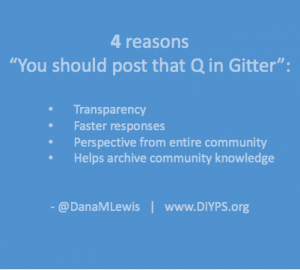“You should post that question in Gitter.” –something @DanaMLewis says a lot
I realize it’s not always obvious to those who are newer to #WeAreNotWaiting or #OpenAPS why I am often pointing people to ask their questions in Gitter.
Let me explain:
There is a Gitter chat channel where most of the #OpenAPS and other DIY development conversations happens. (There are several other channels, so if you pop onto the main OpenAPS one, we’re happy to point you to another if there’s another one already built for another or related project.)
Gitter connects with Github, so you can use the same username to log in and ask a question. And very importantly, it’s public, so *anyone* can see the conversations in channel – even if you decide not to log in. See for yourself – click here to view the chat channel. This is very key for an open source project: anyone can jump in and check things out.
Transparency & archiving community knowledge
It also means that questions can be asked – and answered – openly, so that when someone has the same question, they can often find an existing answer with a little bit of searching.
(Tip: there’s a Gitter app for your phone, and for your desktop, both of which I use on the go – but for searching back in the channel, the web Gitter interface has a better search experience, or you can also use Google to search through the archives.)
Faster responses from a smarter, broader, worldwide community
There’s another key reason why asking a question in an open channel is helpful for Q&A. Two words: time zones. There are now (n=1)*104+ people around the world with DIY closed loops, and a lot of them pay it forward and provide guidance and also help answer questions.
If you send one individual a question in a private channel, you have to cross your fingers and hope they’re a) awake b) not working and c) otherwise available to respond.
But if you ask your question openly in a public channel, anyone out of the large community with the answer can jump in and answer more quickly. Given that we have
a worldwide community and people across many time zones, this means faster answers and more “ah-ha’s” as people collaboratively work through new and already-documented-sticky-
points in the build process.
So if you ask an individual a question in a private channel, you might get a “You should ask that in Gitter!” response. And this is why.

You’re welcome as always to ping me across any channel, but often when there’s a good question, I’m going to want you to re-post in Gitter, anyway, so people can benefit from having the knowledge (including any answers from the community) archived for the next person who has the same or similar question.
 You’re welcome as always to ping me across any channel, but often when there’s a good question, I’m going to want you to re-post in Gitter, anyway, so people can benefit from having the knowledge (including any answers from the community) archived for the next person who has the same or similar question.
You’re welcome as always to ping me across any channel, but often when there’s a good question, I’m going to want you to re-post in Gitter, anyway, so people can benefit from having the knowledge (including any answers from the community) archived for the next person who has the same or similar question.
One thought on “Why you should post that in Gitter”